Putin is very popular today, so why wouldn't I get a bit of hype?
Probably not all of you know this, but the Russian president gives a Q&A session to the Russian citizens once a year.
It's a pretty disputable thing in Russian segment of the internet, however, not so much discussed internationally. In this article I don't want to go through the content of the answers - probably someone else has already done it. What I want to do is to try to analize his speech and find something interesting.
If you're a fanboy, please feel free to read the whole text in English here. Beware, it's an official government website.
Preparation
Well, let me confess: I was listening to the session online. It was the first one for me, probably I'm too old now if I've started doing such a thing.
Long story short - it's a great show. Trying to stay neutral - it's made professionally, using today's technologies. Seriously, the quality is great, even if someone doesn't like it.
Important notice. The show lasted 4 consequent hours. That's why I've divided the session into 12 segments, each lasting 20 minutes approx (let's imagine, that every question took 20 minutes, including the shit talks)
Although the session was intended to be a "live" one, I doubt mr.Putin could answer the questions with all the broad knowledge of any topic without any help. Wanna try a bit of science? Why not.
I've taken the full text in Russian from here. Don't even try to read the hieroglyphs - leave it for me, I'll be your hero translator.
Then, what I've done is I've taken the whole text and deleted the questions and the hosts' phrases. Who cares about those peasants? FYI the hosting girls were HOT!
Download the edited corpus
Then I've imported it into voyant-tools.org. No idea, if it's the best tool for the purpose, let me know in comments if it's not!
See all that stuff? Well, we need to clean it. There's no native list of Russian stop words in Voyant tools, so I've used the one from here
Than I had to delete a couple of stop-words by myself:
Sorry, I've taken into account only first 25 popular words, probably there's something more interesting after, but let's work on the obvious things!
- в.путин ("V.Putin" - This is a marker, when Vladimir starts to speak)
- поэтому ("that is why", in this case - just a conjunction, we don't need it)
- чём ("what", e.g. "about what", for some reason there was no such a form in the list of stop words)
- вопрос ("question", pretty irrelevant, as it's a Q&A session)
First glance
Let's quickly go through top-10 keywords, so you know, what's the current propaganda is based on:
Russian is a flexible language. The forms are strict: singular/plural or different cases are distinguishable

- Должны (They need to do). 41x
To solve the problem, Putin often undrelines who should do it - Людей (of people). 39x
e.g. in context "people's problems". Trying to sound humane! - знаете (you know). 33x
in both senses: e.g. "You know that Russia is the biggest country in the world" or as introductory "I'm cool, you know" - "Кстати", "говоря" (2 words, but both form "by the way"). 31x,30x
Interesting case. "Introduction", special part of speech in Russian. I'll return to those later in the article. - хочу ("I want"). 30x
1st person, singular. Ich will!!! - сделать ("to do"). 29x
I wanted to connect "I want" and "to do", however the distribution seems to be different - it's not always used together: - касается (speaking "about") 27x
Again, introductory part of speech. E.g. as in "Speaking about weather" - России ("of Russia") 27x
no comments - процента ("X percents")
Vladimir Putin seems to be pretty solid when talking about numbers. Used extremely often during first 2 segments!
Hmm
During the first glance, I've found one strange thing. If looking through a distribution of separate words, it seems we can divide the whole session into 4 parts:
1st part (segment 1-2) is the well-prepared speech. Here Putin uses numbers a lot (example with the percentages)
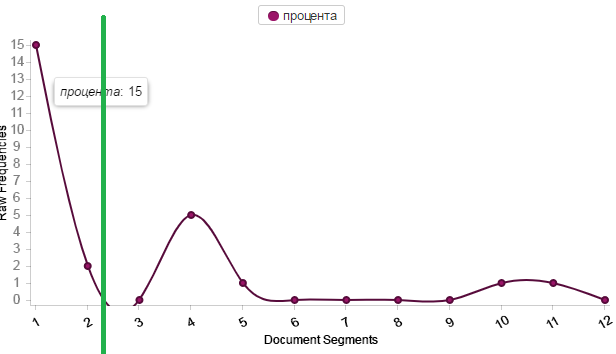
Or speaks about "economics":

Let me quickly jump to the last part. This was a part of quick Q&A, without any deep thinking. We can assume, that it was pure improvisation, so it's not interesting for us.
It's segment 11-12 (e.g. here you'll find usage of the word "questions" in plural:

The most interesting part for me was the middle one. When trying to clean the corpus, I've found a strange coincidence.
In Russian we have so-called "parasite" words. It's a word a person uses extremely often (e.g. in English people tend to use "like" parasite word. I was, like, amazed to watch this, like, comedy).
The "introduction" part of speech is a great example of a such a "parasite". If mr.Putin wants to troll me, the good way is to analyze this article for the "parasite" words usage, shame on me.
Back to science.
Let's try to see, how is "by the way" distributed all over the speech:
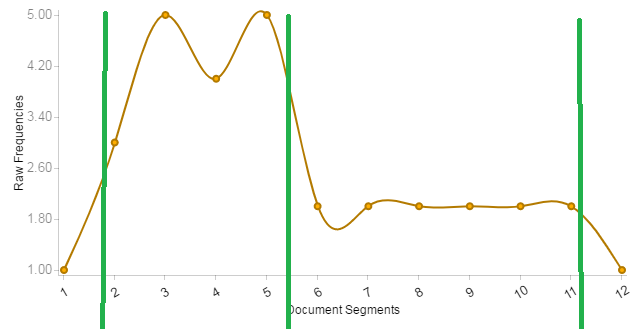
Interesting. Here we have a visible difference between segments 2-6 (let's call it "Anton") and 6-11 (let's call it "Boris")
Let's try to find any other evidence (leaving "by the way" assumption on all the graphs, orange line).
I'll try to attach "speaking about" (in blue) to the graph:
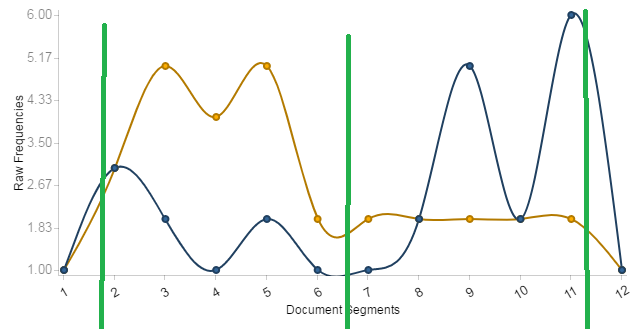
Seems like it's Boris's parasite word, right? The strangest thing is 11-12 segment: if we assume, that the "improvisation" segment is totally up to Putin, jumping from 6x to 1x is rather visible.
Let's try to add "в том числе" (including).
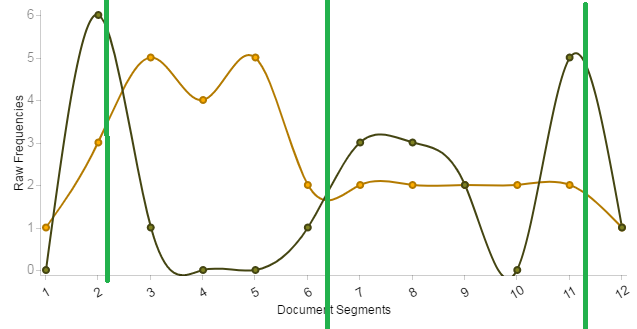
Again, segment 6-11 seems to use this word more often, than others.
OK, if I assume, that segments 1-2 and 11-12 are spoken by the president without any help, any evidence for this?
I've found the usage of the word "country" to be used more often in those segments. Pretty understandable if speaking about the president's lexicon, right?

Well, if we want to go deep into the details, e.g. here's the word "happens" (in blue). "Anton" seems not to like it (why not?)
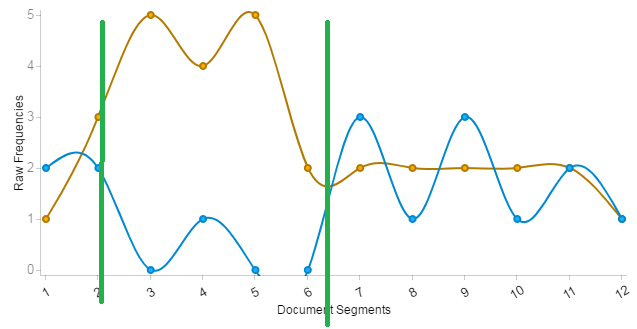
Or I've found a fun fact - usage of the word "самое" (the most). Do you know who deals in absolutes? No, no Siths, it's "Boris":

Impressions
Well, from the first sight it seems that there were 2 assistants, which were helping Vladimir Putin during his 2017 Q&A session. No doubt, speaking 4 hours in a row is not a task everyone can easily complete. Somewhere in the segment 5-6 the first assistant seems to be substituted to the more experienced one (he lasted longer), and in the end the quick improvisation was given.
Or do you think it's just a coincidence?
